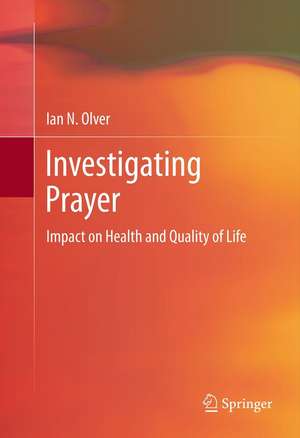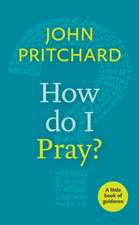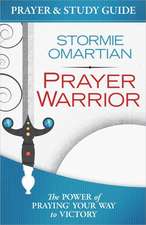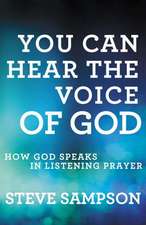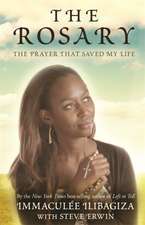Investigating Prayer: Impact on Health and Quality of Life
Autor Ian Olveren Limba Engleză Hardback – 11 oct 2012
| Toate formatele și edițiile | Preț | Express |
|---|---|---|
| Paperback (1) | 651.97 lei 39-44 zile | |
| Springer – 9 noi 2014 | 651.97 lei 39-44 zile | |
| Hardback (1) | 661.69 lei 39-44 zile | |
| Springer – 11 oct 2012 | 661.69 lei 39-44 zile |
Preț: 661.69 lei
Preț vechi: 696.52 lei
-5% Nou
Puncte Express: 993
Preț estimativ în valută:
126.62€ • 135.39$ • 105.57£
126.62€ • 135.39$ • 105.57£
Carte tipărită la comandă
Livrare economică 14-19 aprilie
Preluare comenzi: 021 569.72.76
Specificații
ISBN-13: 9781461445708
ISBN-10: 1461445701
Pagini: 160
Ilustrații: X, 150 p.
Dimensiuni: 155 x 235 x 14 mm
Greutate: 0.36 kg
Ediția:2013
Editura: Springer
Colecția Springer
Locul publicării:New York, NY, United States
ISBN-10: 1461445701
Pagini: 160
Ilustrații: X, 150 p.
Dimensiuni: 155 x 235 x 14 mm
Greutate: 0.36 kg
Ediția:2013
Editura: Springer
Colecția Springer
Locul publicării:New York, NY, United States
Public țintă
ResearchCuprins
Chapter 1. What is Prayer and Why Study it?.- Chapter 2. Studies of Prayer as a Complementary Therapy.- Chapter 3. A Theological Reflection on Prayer.- Chapter 4. The Relationship Between Spiritual Wellbeing and Quality of Life.- Chapter 5. A Randomized Blinded Study of Intercessory Prayer in Patients with Cancer.- Chapter 6. The impact of the study on the trials team.- Chapter 7. Response to our Study of Prayer.- Chapter 8. What next?
Recenzii
From the reviews:
“This book examines the effect of prayer on quality of life, particularly as a possible complementary or alternative therapy to fight illness. … the book is easy to read and a good introduction to this subject … . The book does a good job of exploring this important topic. Many clients are interested in spirituality, so it makes sense to study prayer as a complementary adjunctive treatment to traditional medicine.” (Gary B. Kaniuk, Doody's Book Reviews, March, 2013)
“The purpose of this volume is to scientifically study the existence and effects of a spiritual reality … on the physical health of patients with cancer. The volume also explores various ethical issues associated with scientific research in the spiritual arena … . this volume is highly recommended as required reading for a wide range of quality of life researchers, students, as well as for members of the general public who share an interest in the book’s subject matter.” (P. Zanor, Applied Research in Quality of Life, Vol. 8, 2013)
“This book examines the effect of prayer on quality of life, particularly as a possible complementary or alternative therapy to fight illness. … the book is easy to read and a good introduction to this subject … . The book does a good job of exploring this important topic. Many clients are interested in spirituality, so it makes sense to study prayer as a complementary adjunctive treatment to traditional medicine.” (Gary B. Kaniuk, Doody's Book Reviews, March, 2013)
“The purpose of this volume is to scientifically study the existence and effects of a spiritual reality … on the physical health of patients with cancer. The volume also explores various ethical issues associated with scientific research in the spiritual arena … . this volume is highly recommended as required reading for a wide range of quality of life researchers, students, as well as for members of the general public who share an interest in the book’s subject matter.” (P. Zanor, Applied Research in Quality of Life, Vol. 8, 2013)
Notă biografică
Ian Olver, MD, PhD, is a Fellow of the Royal Australasian College of Physicians, its Chapter of Palliative Medicine, and is a member of the Royal Australian College of Medical Administrators. He completed a PhD from Monash University in bioethics, exploring life and death issues, and a Certificate of Ministry at the Adelaide College of Divinity. He trained in medical oncology at Peter MacCallum Cancer Institute, the Alfred Hospital in Melbourne, and the University of Maryland Cancer Center in Baltimore. In 2006 he was appointed CEO, Cancer Council Australia, a Clinical Professor in the Department of Medicine at the University of Sydney, and he is an Honorary Associate, Department of Medical Oncology, Royal Prince Alfred Hospital. After serving on several ethics committees in Victoria and South Australia and the American society of Clinical Oncology Ethics Committee, and chairing the Cancer Institute NSW Research Ethics Committee for multicenter cancer trials, he now sits on the Australian Health Ethics committee of the NHMRC and chairs the Medical Oncology Group of the Australia Ethics Committee. In 2008 he was awarded the Cancer Achievement Aware by the Medical Oncology Group of Australia.
Textul de pe ultima copertă
From the ancients to the Renaissance, religion and medicine worked hand in hand to heal the people, until the scientific minds of the Enlightenment created a physical model of illness without a spiritual component. In this century, spirituality is gaining recognition as part of individuals’ psychological makeup and capacity for meaning-making, and gaining currency as part of holistic concepts of wellness despite resistance from many in the scientific community.
Prayer: Investigating Its Impact on Quality of Life brings science and spirituality together, pointing out thought-provoking parallels and asserting that each can enrich the other. At the book’s center is a detailed study of a randomized double-blinded trial that added intercessory prayer (i.e., prayer for others) to conventional cancer treatment, with findings relevant to conceptions of prayer as intervention. In addition, a review of salient medical literature (including complementary and alternative medical journals) contains both positive and negative studies, encouraging a vigorous dialogue about methodology, endpoints, and whether metaphysical phenomena can—or should—be studied using scientific methods. Among the topics covered:
· The role of spirituality in illness.
· Prayer as complementary or alternative therapy.
· The relationship between spiritual wellbeing and quality of life.
· Instruments for assessing religious and spiritual belief.
· A randomized blinded study of intercessory prayer in patients with cancer.
· Possible directions for further research.
Prayer: Investigating Its Impact on Quality of Life should interest readers on all sides of the debate, including doctors, practitioners, psychologists, psychiatrists, and others involved in holistic treatment of patients.
Prayer: Investigating Its Impact on Quality of Life brings science and spirituality together, pointing out thought-provoking parallels and asserting that each can enrich the other. At the book’s center is a detailed study of a randomized double-blinded trial that added intercessory prayer (i.e., prayer for others) to conventional cancer treatment, with findings relevant to conceptions of prayer as intervention. In addition, a review of salient medical literature (including complementary and alternative medical journals) contains both positive and negative studies, encouraging a vigorous dialogue about methodology, endpoints, and whether metaphysical phenomena can—or should—be studied using scientific methods. Among the topics covered:
· The role of spirituality in illness.
· Prayer as complementary or alternative therapy.
· The relationship between spiritual wellbeing and quality of life.
· Instruments for assessing religious and spiritual belief.
· A randomized blinded study of intercessory prayer in patients with cancer.
· Possible directions for further research.
Prayer: Investigating Its Impact on Quality of Life should interest readers on all sides of the debate, including doctors, practitioners, psychologists, psychiatrists, and others involved in holistic treatment of patients.
Caracteristici
Focuses on studying prayer from a scientific research perspective Includes a discussion about the impact of the study on the investigators, data managers, and ethics committee members
